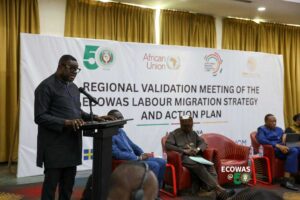ECOWAS Launches Labour Migration Strategy 2025–2035 in Accra, Shapes the Future of Work in West Africa. By Raymond Enoch
In a bold step toward advancing regional integration and promoting decent work, the Economic Community of West African States (ECOWAS) Commission, in partnership with international and regional stakeholders, has launched a high-level Validation Workshop for its Labour Migration Strategy and Action Plan (2025–2035) in Accra.
Held on May 13, 2025, the opening ceremony was graced by Ghana’s Minister for Employment and Labour Relations, Dr. Abdul-Rashid Hassan Pelpuo, who delivered the keynote address. Dr. Pelpuo reaffirmed Ghana’s dedication to safeguarding mobility rights, upholding decent labour standards, and championing a unified West African labour market.
“We are committed to building a future where labour mobility contributes not only to economic growth but to social justice, security, and cohesion within our region,” Dr. Pelpuo stated.
The event brought together high-level representatives from the ECOWAS Commission, the International Organization for Migration (IOM), the International Labour Organization (ILO), the African Union Commission, and various social partners. Delegates from ECOWAS Member States and technical partners gathered to validate the Strategy, which will steer labour migration governance across the region for the next decade.
Anchored in ECOWAS Vision 2050 and guided by the Protocol on Free Movement of Persons, the Strategy aims to transform labour mobility into a well-governed, safe, and regular process that promotes sustainable development. Core focus areas include data harmonisation, social protection for migrant workers, diaspora engagement, and gender-responsive frameworks to ensure inclusivity.
The three-day workshop also follows courtesy visits held a day earlier, which helped reinforce institutional alignment and stakeholder ownership. These efforts underscore a shared vision: to make migration a catalyst for economic opportunity and social inclusion in West Africa.
As ECOWAS and its partners refine and adopt this forward-looking strategy, the region moves one step closer to creating a cohesive, inclusive, and resilient labour ecosystem—where no worker is left behind.








